
Right to Relief
Communities
Speak Out
Cambodia's microfinance over-indebtedness crisis is leading to human rights abuses. In 2020, the average microloan in Cambodia was $4,280 – the largest in the world. The average microloan was larger than 95% of Cambodians' incomes. There were 2.8 million microloans held across the country's 3.6 million households.
Desperate borrowers face immense pressure to repay these loans, many of which are collateralised with borrowers’ land titles. This project features the experiences of 14 communities who are affected by microloan debt and land conflicts. Click on the map below to read their stories, or read more about who we are and why we did this project.
Click on any of the filters in the box below to find out which communities are facing these problems.
Filter by unethical behaviours of credit officers
Aggressive collection practices • Pressured land sales • Threats • Encouraged use of private lenders • Fraud
Filter by negative consequences of microloans
Borrowing from private lenders • Eating less food • Selling possessions • Land sales • Child labour • Migration
Filter by reasons for borrowing
Repaying other debt • Healthcare • Building a house • Agriculture • Child's education
Click on community markers on the map to view their full profiles.
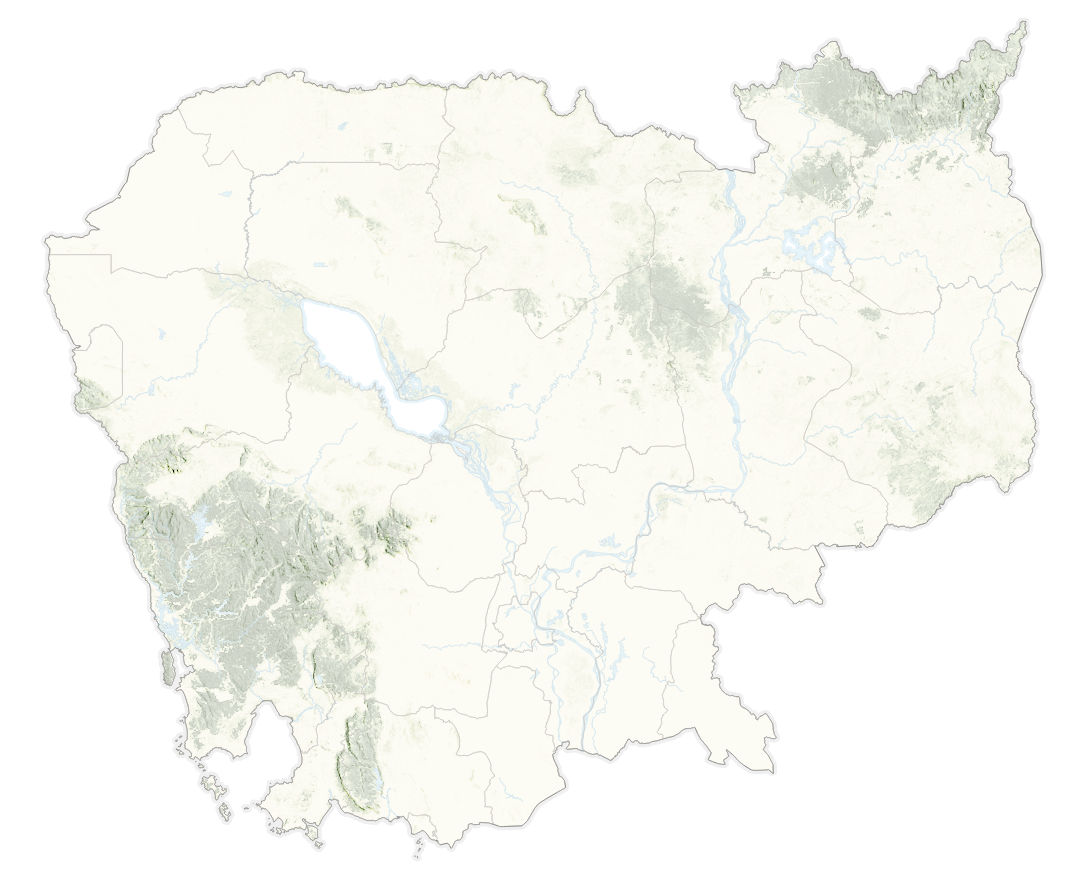
Number of Families
386
Start of Land Conflict
2011
Percent of Families with MFI Debt
70-90%
Average Loan Size
$1,000 USD
Sources of Income
Agriculture • Animal husbandry • Day labourer • Migration • Non-timber forest products • Seller
Kam and Kres are two indigenous communities in Ratanakiri’s Ou Chom district. Residents are primarily farmers, and none work in factories or migrate abroad, though some move to the nearby provincial town for work. People grow crops, such as rice, rubber, cassava, cashews, bananas and beans; raise animals, like cows, buffalo, pigs, chickens and ducks; gather NTFP; and work various jobs in the provincial capital town. Both communities have communal land, and Kres has a collective land title recognised by the Ministry of Interior.
Both communities were affected by the Hoang Anh Gia Lai (HAGL) rubber firm, which in 2011 began to clear and seize land, including community land, such as community forests, lakes and canals; religious sites, such as mountains where Arak spirit lives and spirit forests; Chrob and Chrab (land for collecting vegetables, fish, and meat); burial forests; and other sacred spaces and communal land. Following the clearing of one spiritually significant area, one villager died from a lightning strike, a communal building was hit by lightning, a community leader died in his sleep, and a previous village leader lost consciousness. Some of the land lost to the company was rotational farmland, and community members are concerned if they lose that land, that they will not have land to give to their children.
Quotes from the community
Known microloan lenders in community
Reasons for Borrowing
Agriculture • Build a house • Business • Buy a motorbike • Buy land • Child’s education • Healthcare • Religious ceremony • Repay other debt
Microfinance debt is common in both Kam and Kres. Between 70% to 90% of families have borrowed a microloan, many of those collateralized with land titles. In Kam, about half of loans are group loans, which do not require land titles for collateral. At least 6 families have sold land to repay debt, and community members suspect there were more cases. Credit officers often used aggressive collection practices, including threatening to call the police to arrest borrowers and encouraging the use of private lenders if borrowers are a few days late on their repayments. Many community members were confused and frustrated over fees collected by the MFIs, including late fees, and the lack of relief given to borrowers during Covid-19.
Unethical Behaviours of Credit Officers
Aggressive collection practices • Aggressive lending practices • Encourage use of private lenders • Pressured land sales • Threats
Negative Consequences of Microloans
Borrow from MFIs • Borrow from private lenders • Child labour • Eat less food • Land sales • Migration • Sell possessions • Trouble sleeping
Microloan providers and their international investors, including many of Europe’s and the United States’ largest development banks, have a moral obligation to address human rights abuses and provide proper remedy and redress. Cambodian borrowers must have the right to relief, or else they will continue to face debt-driven hunger, child labour, migration, coerced land sales, and many other human rights abuses raised as part of this project.
Equitable Cambodia (EC) and the Cambodian League for the Promotion and Defense of Human Rights (LICADHO) are human rights NGOs registered in Cambodia. Both organisations are dedicated to amplifying the voices of grassroots communities and highlighting human rights abuses perpetrated by private and public actors in Cambodia.
This project is based on the principles of community-based research, where community members play an active role in producing knowledge and act as co-researchers. Information was gathered from both focus-group discussions with community members as well as individual interviews. All the information in this report comes from discussions with community members and was verified with community representatives. This project is not meant as the only true source of information about microloans, but rather is meant to accurately reflect the lived experiences of community members. Many of these issues have been raised before in previous reports issued by human rights NGOs in Cambodia.
Many Cambodians are drowning in microloan debt, which is leading to drastic and serious human rights violations across the country, and many people are suffering in silence. To quote one community representative who participated in this project: “I’m happy that our sadness is finally being publicised. We have kept it hidden for so long. The way [the MFIs] act is the opposite of the way they speak. Debt is the biggest problem faced by communities across the country.”
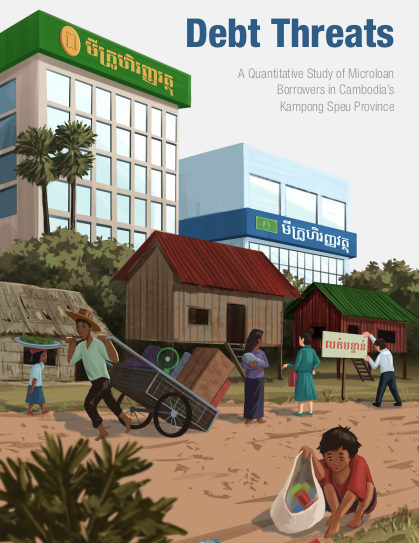
Debt Threats: A Quantitative Study of Microloan Borrowers in Cambodia’s Kampong Speu Province
Released in August 2023
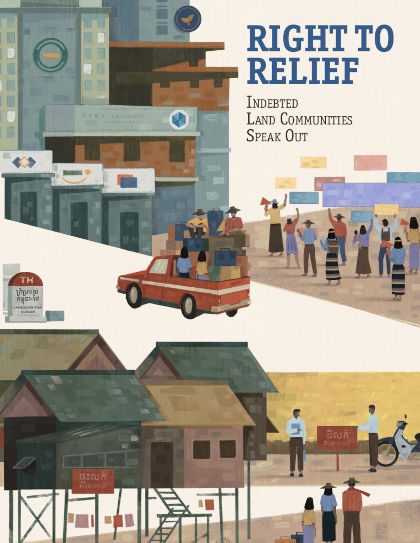
Right to Relief: Indebted Land Communities Speak Out
Released in June 2021
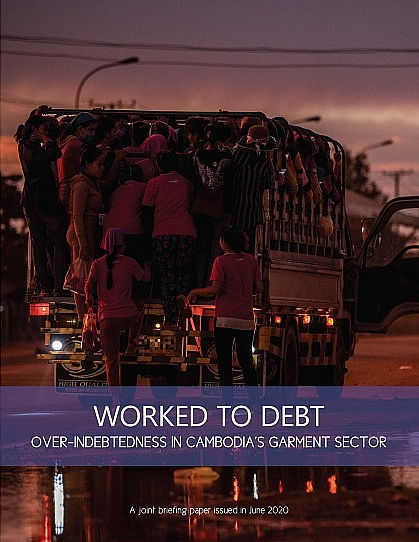
Worked to Debt: Over-Indebtedness in Cambodia's Garment Sector
Released in June 2020
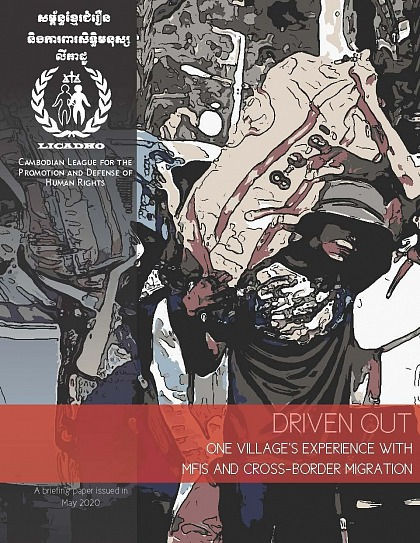
Driven Out: One Village's Experience with MFIs and Cross-Border Migration
Released in May 2020
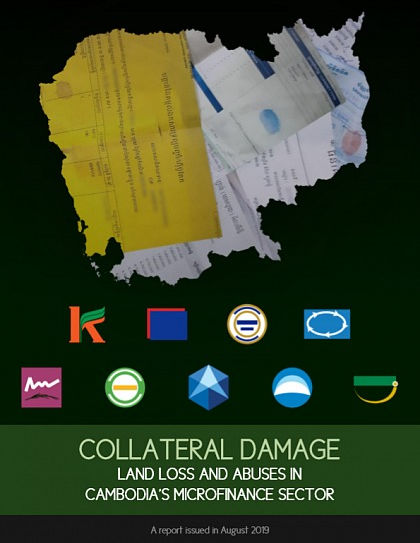
Collateral Damage: Land Loss and Abuses in Cambodia's Microfinance Sector
Released in August 2019